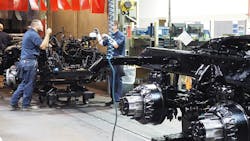Opponents decry EPA’s glider kit proposal during public hearing
Opponents of the Environmental Protection Agency’s (EPA) proposal to exempt heavy-duty gliders from the Phase 2 greenhouse gas (GHG) rule argued the move would undercut significant investments manufacturers have already made in order to comply with the GHG emissions standards.
During the earlier part of a daylong public hearing on Dec. 4, Pat Quinn, executive director of the Heavy-duty Leadership Group, whose members include Cummins, PepsiCo, FedEx, Eaton, Wabash National and Waste Management, said “making modifications to the glider kit provision would undermine investments made in the industry, encourage the use of older, less efficient technologies, and increase smog-forming pollution that harms public health.”
The group worked closely with EPA in the development of the Phase 2 rule, which was finalized during the Obama administration.
However, earlier this year, EPA said that gliders should not be regulated as “new motor vehicles” or “new motor vehicle engines” under the Clean Air Act. In November, EPA administrator Scott Pruitt signed legislation to repeal emissions standards for glider kits. He said they provide a more affordable option for smaller owners and operators.
During the hearing, Glen Kedzie, vice president of American Trucking Assns.’ (ATA) energy and environmental affairs council, stated ATA members strongly oppose EPA changing the course of the agency’s glider provisions.
“U.S. member fleets have worked tirelessly to be both sustainable and environmentally sensitive in their operations,” Kedzie explained.
According to ATA, the proposed repeal would circumvent today’s emissions standards for diesel particulate matter (PM), NOx and greenhouse gases.
“It’s well-known that gliders are purchased to save money, avoid maintenance costs and late penalties, and skirt federal excise tax payments,” Kedzie said, adding that ATA member fleets have paid $31,000 more on average per new truck since 2004 to comply with new emissions rules.
“While the best-run trucking companies in the nation are heavily investing and cleaning up the environment and improving the overall profile of the industry, the glider vehicle industry openly promotes their sale of ‘pre-emission’ engines and uses the cost savings differential between clean diesel technologies and high-emitting old trucks as a promotional sales pitch,” he stressed.
Steven Cliff, deputy executive officer of the California Air Resources Board (CARB), called the proposal illegal, adding it would have a “profoundly harmful impact on public health.”
“The repeal would effectively place thousands of outdated, heavy-duty engines that do not meet modern emissions standards that have been in effect in the last decade on our highways,” he said. “In short, a repeal puts our most disadvantaged communities at risk by walking away from the commitment to reduce their exposure to smog forming and toxic pollutants that impact public health, leading to additional hospitalizations, asthma cases, lost work and school days, and premature deaths.”
Modern trucks that meet current emissions standards come with diesel particulate filters to capture toxic diesel particulate matter and selective catalytic reduction systems to NOx emissions. Cliff emphasized that reducing diesel PM is important to cut cancer and other health risks.
“Glider builders have been circumventing the requirements for these important emissions controls by using pre-2007 remanufactured engines, misusing a loophole in the provisions to sell thousands of dirty trucks each year with completely uncontrolled emissions,” Cliff pointed out.
Congressman Jamie Raskin of Maryland remarked that he was “baffled and confounded” as to why the EPA would consider repealing this rule. Raskin noted that after one of the largest manufacturers of gliders, Fitzgerald Glider Kits, located in Tennessee, failed to secure a legislative repeal of the glider kits rule via the annual appropriations process, Fitzgerald’s owners met directly with Pruitt this past May.
According to Raskin, Fitzgerald’s petition included new information on glider vehicle criteria pollutant emissions which purported to show that glider vehicles were less polluting than non-glider vehicles.
Though opponents of the exemption came out in droves – at least during the earlier part of the hearing – glider builder and trucker Farrell “Dale” Clark Jr., president of D & B Trucks, said he fully supported the proposal.
“Glider engines, glider kits and glider vehicles are used parts that still have adequate life in them,” Clark explained. “By recycling gliders, we can further the life of the existing parts that are so costly to buy new.”
In his comments, Clark stressed that the only new parts in a glider kit are the cab and the hood; the remaining parts of the truck are all used parts.
“In no way should a glider be considered a new truck, subject to the new emissions rules set forth in August 2016 because all major components are used and already exist,” he explained.
Clark referenced a study recently conducted by Tennessee Tech University (TTU) comparing NOx levels in older engines versus new engines. He said the study found that older engines are just as clean – and some even better – than the new ones today, mainly due to cleaner sulfur content.
Cliff, however, in his comments, noted that TTU study is “invalid and lacks scientific credibility.”
In addition, Raskin had this to say about the study: “It is important to note that the study, run by Tennessee Tech University, has been criticized by experts for its poor and shoddy quality and has provoked serious ethical questions about the university’s academic independence and its cozy relationship with Fitzgerald,” he stated, adding that the study was done at Fitzgerald’s request and paid for with grant money from Fitzgerald.
But during his presentation, Clark also cited a Nov. 15 statement released from Pruitt that encouraged Americans to recycle more. Clark claimed that according to most recent data from 2007, recycling and reclaimed and reused activities created more than 750,000 jobs and $6.7 billion in tax revenues.
“We really should be thanking our glider builders,” he urged. “We should be encouraging every trucker in this country to use a glider, or should I say a recycled truck. This is exactly what we do in our business. We recycle old trucks, not only do we create hundreds of jobs, we save our trucking industry thousands of dollars.”
EPA estimates that about 10,000 gliders are manufactured annually and make up about 5% of the entire Class 8 truck market. However, the agency previously said gliders could account about one-third of all nitrogen oxides and particulate matter emissions from the sector.
Written comments regarding the proposed repeal will be accepted until Jan. 5.
About the Author

Cristina Commendatore
Cristina Commendatore is a past FleetOwner editor-in-chief. She wrote for the publication from 2015 to 2023.

